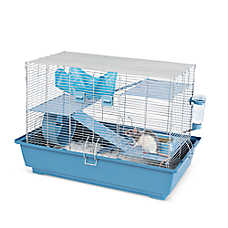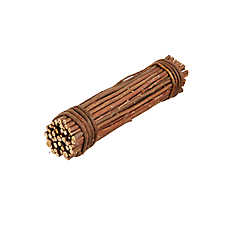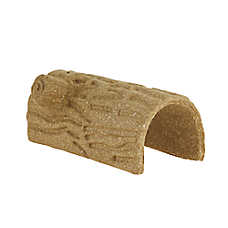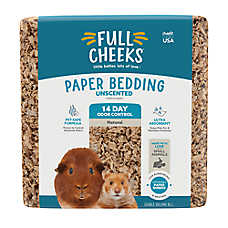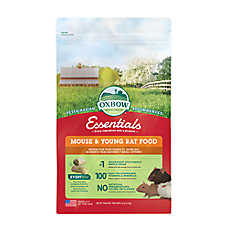Mouse Care Guide
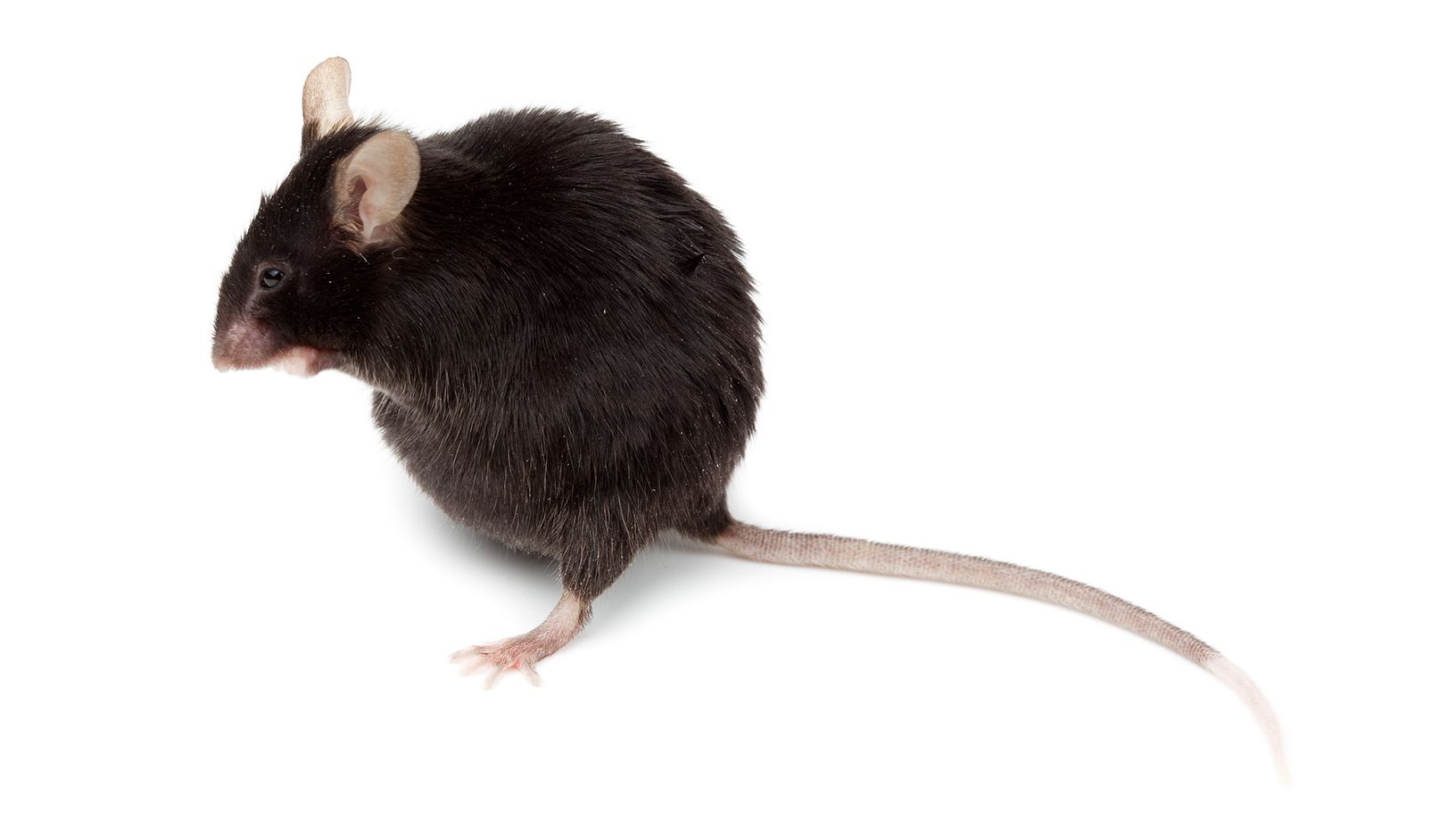
In this Article
Marvelous Mice!
The most common variety of pet mouse is the Fancy Mouse. What makes them so fancy? Well, funny enough, the fancy mouse is actually a domesticated version of the wild house mouse. Like many rodents, pet mice get a bad reputation for being considered “dirty” and “gross.” In reality, mice are very intelligent, inquisitive, and interactive. They are not overly messy, and are less likely to bite than some other species. Given time to get used to their new home, pet mice make fantastic additions to the family.
Species Profile:
Scientific/Common Name: Fancy Mouse (Mus musculus f. domesticus)
- Size: Fancy mice grow up to 2 to 3" (5-8 cm), not including their tail
- Lifespan: They live for approximately 2 years.
- Behavior: Mice are nocturnal so they are most active in the evening. They can be sensitive to light and noise but tend to acclimate over time to the hustle and bustle of domestic life.
- Temperament: Fancy mice are inquisitive by nature, but can be timid and easy to startle. When handled gently and regularly, they make wonderful companions. Fancy mice naturally live in social groups, and especially females do not like to be alone. We recommend housing your mice in same-sex pairs to help meet their social needs and minimize the risk of accidental pregnancies.
Housing note: Mice can be territorial. Just like human siblings, it is best to make sure there’s enough toys, bedding and bowls for everyone so they don’t feel the need to compete. Ensuring there is plenty of space and resources for all animals in the enclosure is one of the best ways to mitigate fighting. Observe your mice closely when introducing them and be prepared to separate them should a fight occur.
Setting up your Mouse habitat
Mice like having multiple levels to their habitat to explore, and also enjoy having plenty of toys to gnaw on and play with. It is recommended to have lots of options for your mice so they don’t feel the need to compete with each other over resources.
Choosing the right mouse enclosure
Size and setup:
- House your mouse in a habitat that's at least 200 square inches, with multiple levels
- Keep in mind that if you have multiple mice, you will want to increase the cage size
- Place the habitat out of direct sunlight in a low humidity area that's between 65-75°F (18-24°C) and not in a high-traffic or loud area
Mouse bedding and cleaning
Bedding:
- Line the habitat with an appropriate amount of clean bedding (about 1" deep)
Cleaning schedule:
- The bedding should be spot cleaned as needed
- The whole cage should be deep cleaned every 1 to 2 weeks
Mouse habitat essentials
Hiding spots:
- Your mouse's habitat should include hides where it can play, rest and chew
- Clean hides regularly
Enrichment items:
- Don't forget your enrichment! Place your exercise wheel, your chew(s), toys, hides and any other enrichment items into the habitat
Exercise wheel safety for mice
Avoid using a wire or slatted exercise wheel. Instead, opt for a solid wheel. Wire or slotted wheels carry a risk of your mouse getting their leg caught between the slats and can be seriously injured. Solid wheels eliminate this risk and can be easier to clean as you don't have to get into as many nooks and crannies.
Feeding your Mouse
Mice are omnivores in the wild and eat a variety of foods including seeds, nuts, plant vegetation and insects. Mouse pellets provide well balanced nutrition for your pet, but are not the only thing your mouse will need.
Daily mouse diet staples
Pelleted food:
- A pelleted mouse diet is the most complete diet option for your pet
- This should be available 24/7, and the bowl refreshed daily
Fresh vegetables for mice
Every other day feeding:
- Fresh vegetables should be offered every other day in addition to the pelleted diet to increase variety into the diet as well as to help supplement hydration
Safe vegetable options:
- Safe vegetables include: peas, kale, squash, and carrots
Treats and fruit for mice
Weekly treats:
- Fruit can be offered once a week as a treat
- Treats should be limited to help prevent risk of obesity
Safe fruit options:
- Safe fruits include: apples, melons, berries, oranges, pears, and bananas
Understanding mouse teeth
Many rodents, including mice, have front teeth that keep growing their entire life. These are called "hypsodont" teeth and, unlike human teeth, hypsodont teeth will continually grow longer and longer.
In addition to regular feedings, mice need things to gnaw on, like wood chew sticks, to keep their teeth at an appropriate length so they can chew and eat normally and without pain. If you notice your pet is having difficulty eating, you may want to have a vet evaluate their teeth to make sure they're not overgrown.
Mouse hydration
Water access:
- A water bottle attached to the side of the cage should be available at all times and refreshed daily
When to see a vet
In addition to regularly scheduled appointments, contact your small animal veterinarian if you notice the following signs:
- cloudy, sunken or swollen eyes
- wheezing
- sneezing; discharge from the eyes, nose or mouth
- overgrown front teeth
- drooling
- inability to close mouth, food falling from mouth frequently
- not eating
- bare patches in the fur
- sores or swelling/changes to the feet
- weight loss; not eating or drinking normally
- diarrhea or discolored droppings
SHOPPING CHECKLIST
- habitat sized 200 square inches or larger (multilevel home preferred)
- rodent block/fortified mouse diet
- food dish
- water bottle
- bedding and nesting material
- solid exercise wheel without slats
- Toys – ropes, cardboard tubes, tunnels
- hide
- treats
- wood chew
FAQs
Can I house multiple mice together?
Yes, fancy mice naturally live in social groups, and especially females do not like to be alone. We recommend housing your mice in same-sex pairs to help meet their social needs and minimize the risk of accidental pregnancies. However, mice can be territorial. Just like human siblings, it's best to make sure there's enough toys, bedding and bowls for everyone so they don't feel the need to compete. Ensuring there is plenty of space and resources for all animals in the enclosure is one of the best ways to mitigate fighting. Observe your mice closely when introducing them and be prepared to separate them should a fight occur.
What temperature is safe for my mouse?
Keep your mouse's habitat in a low humidity area that's between 65-75°F (18-24°C), out of direct sunlight and not in a high-traffic or loud area. This temperature range helps keep your mouse comfortable and healthy.
Why is my mouse most active at night?
Mice are nocturnal so they are most active in the evening. They can be sensitive to light and noise but tend to acclimate over time to the hustle and bustle of domestic life. This is normal behavior for mice.
What type of exercise wheel is safest for my mouse?
Avoid using a wire or slatted exercise wheel. Instead, opt for a solid wheel. Wire or slotted wheels carry a risk of your mouse getting their leg caught between the slats and can be seriously injured. Solid wheels eliminate this risk and can be easier to clean as you don't have to get into as many nooks and crannies.
What should I feed my mouse daily?
A pelleted mouse diet is the most complete diet option for your pet. This should be available 24/7, and the bowl refreshed daily. Fresh vegetables should be offered every other day in addition to the pelleted diet to increase variety into the diet as well as to help supplement hydration. Safe vegetables include: peas, kale, squash, and carrots.
Can I give my mouse fruit?
Yes, fruit can be offered once a week as a treat. Safe fruit options include: apples, melons, berries, oranges, pears, and bananas. Treats should be limited to help prevent risk of obesity.
How do I know if my mouse's teeth are overgrown?
If you notice your pet is having difficulty eating, you may want to have a vet evaluate their teeth to make sure they're not overgrown. Mice need things to gnaw on, like wood chew sticks, to keep their continuously growing teeth at an appropriate length so they can chew and eat normally and without pain.
How much space does my mouse need?
House your mouse in a habitat that's at least 200 square inches, with multiple levels. Keep in mind that if you have multiple mice, you will want to increase the cage size. Mice like having multiple levels to their habitat to explore, and also enjoy having plenty of toys to gnaw on and play with.
Need other cat supplies while you’re shopping for small pets? PetSmart also carries small pet food, small pet cages, small pet treats, small pet hay, small pet litter and bedding, small pet toys and much more. Explore PetSmart’s Small Pet Shop to find everything your cat needs, all in one place.
PetSmart offers convenient shopping with Curbside Pickup or in-store pickup. Need something today? We have select items available for Same-Day Delivery in most areas powered by DoorDash. For items you purchase frequently, PetSmart has Autoship that automatically delivers the items you want to your door as often as you’d like. Check the website to see which items are eligible.
Information in this article is not intended to diagnose, treat or cure your pet and is not a substitute for veterinary care provided by a licensed veterinarian. For any medical or health-related advice concerning the care and treatment of your pet, contact your veterinarian.
©2025 PetSmart LLC Vet Assured™: Pets purchased at PetSmart are part of our exclusive Vet Assured™ program, designed by PetSmart veterinarians to help improve the health and well-being of our pets. Our vendors meet a high standard in caring for pets and screening them for common illnesses. This program also includes specific standards for in-store pet care. The PetSmart Promise: If your pet becomes ill during the initial 14-day period, or if you’re not satisfied for any reason, PetSmart will gladly replace the pet or refund the purchase price. This care guide contains general information for the proper care of your pet, but is not comprehensive and is not a substitute for veterinary advice or care. PETSMART and VET ASSURED are trademarks of PetSmart Home Office, Inc. © 2025 PetSmart. All rights reserved.
